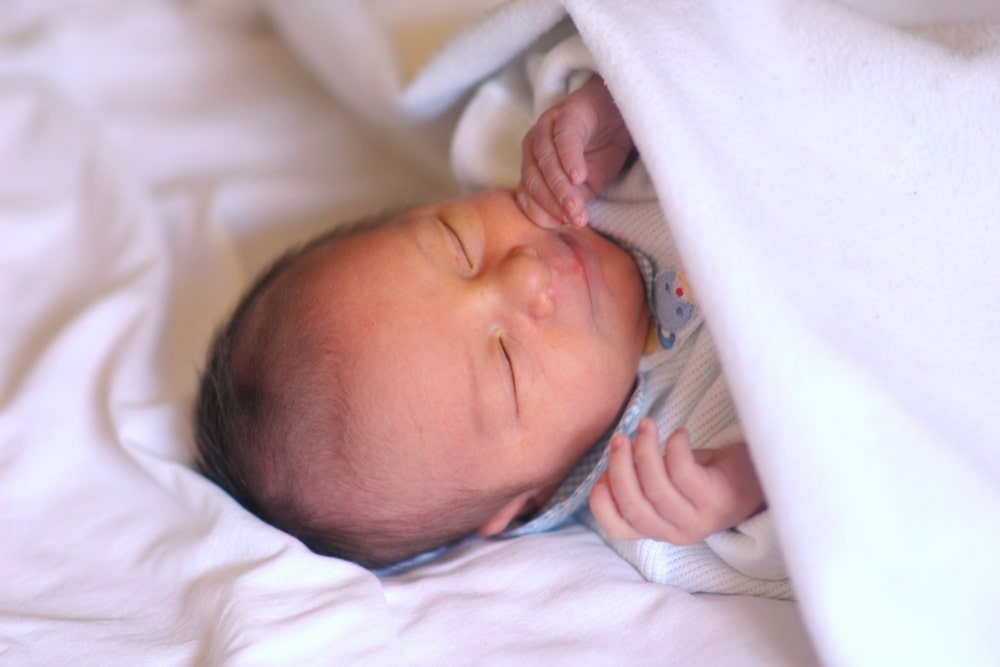Babies are tricky little creatures, from the minute they are born they turn their parent’s lives upside down. But I bet you never thought that when you became a parent that your newborn would be partying as though they were in college!
However, it’s not their fault they are a little confused about day and night so here are 10 easy ways to fix baby’s day-night confusion.
What Is Day Night Confusion?
Day-night confusion is exactly what it says on the tin – it is when your baby gets their days and nights mixed up.
This then leads to them sleeping for long stretches in the day while you are up and about and then being wide awake at night when sleep-deprived parents need to get some much-needed sleep!
Why Do Babies Get Their Days and Nights Mixed Up?
While you were pregnant you may have noticed that throughout the day you would rarely feel much movement from your little one but once you sat down in the evening it was like a switch was turned on and the party began.
Your baby would spring to life and start dancing around your womb.
The truth is that while you were going about your daily life of work, exercise, commuting, and household chores your baby was being gently rocked to sleep by your body’s continual movements.
Then once you settled down to relax for the night that was your baby’s queue to start their gymnastic display.
This is one of the reasons that your newborn may be sleeping all day and awake all night. It is simply the routine that they are used to!
Another reason for their confusion is that your baby’s circadian rhythm is still very immature. It is not until around 2-4 months old that it is fully developed which is also why you will find that your baby eats every 2-3 hours both day and night.
But do not despair just because it is normal for your newborn to be nocturnal does not mean that you have to as well.
Around 6 weeks of age you may begin to notice a change in your little ones’ day-night confusion and they may begin to sleep for longer periods of time at night, around 3-5 hours maybe longer if you are lucky.
This is amazing news for all sleep-deprived parents!!
View in gallery
When Will Baby Have Their Days And Nights Sorted?
By the time your baby reaches 3-4 months old their sleep pattern should have naturally moved from day to night. By this time their production of melatonin regulates helping them to get over their day-night confusion.
I know you are thinking that is a long time to wait to get some proper sleep. But do not panic as newborns can also be easily influenced by outside factors meaning that you can speed up this process
Breastfed vs Formula Fed
In order to sleep, babies need something called Tryptophan which is a precursor to the sleep-inducing hormone called melatonin. It is an essential nutritional requirement but our bodies cannot make it.
So we must rely on getting it from our food this is why it is found in both breast milk and infant formulas.
Now the clever bit is that the levels of tryptophan found in breast milk fluctuates throughout the day and night. At night the levels rise, baby feeds and the tryptophan they ingest helps with the production of melatonin.
This was just a theory but was confirmed in this study. In the study, the sleep patterns of babies that were fed formula with or without elevated levels of tryptophan were evaluated.
It was found that those who were fed high levels of tryptophan at night, mimicking nighttime breastmilk, had better sleep patterns.
10 Easy Ways To Fix Baby’s Day Night Confusion
While you are waiting for your beautiful precious bundle to get their day-night confusion sorted there are a few things that you can do to help them begin to get a regular sleep pattern in place.
These tips are not going to miraculously make your baby sleep through the night but they will help you to get longer stretches of sleep at night when you really need it the most!
1. Night Feeds Should Be Dark
It is completely normal for your baby to wake several times through the night for the first few months of their life to feed. But the trick here is to feed them and get them back to sleep ASAP.
The best way to do this is to keep the room dimly lit. Do not turn on any bright overhead lights, try to use a soft nursing light.
This will help to prevent waking your baby up completely and keep them in that dreamy state between sleep and awake meaning that they will be easier and quicker to get back to sleep.
2. Do Not Make Eye Contact During Night Feeds
Keep night feeds low-key and boring. Do not talk to your baby or make eye contact with them during the middle of the night. These types of interactions can stimulate your baby and can make them wake up and want to interact with you.
The best routine for nighttime feeds is a quick diaper change if needed, a feed, and then put them back to bed.
I know that this can feel like the complete opposite of what a loving nurturing parent should be doing but it is during the daytime that you need to be making that eye contact, talking to them, and interacting.
And by ensuring that you both get a good night’s sleep will also mean that you have the energy to do just that during the day!
3. Lots Of Daytime Interaction
When your baby is awake during the day make sure that you spend lots of time interacting with them, talk to them, make lots of eye contact, and play with them. This will help them to begin learning that daytime is when you have fun and play and nighttime is for sleep.
Daytime feeds should be full of attention this will also help them to notice a difference between daytime and nighttime feeds – helping to establish a routine and sort out the day-night confusion.
4. Make Mornings A Big Deal
When your baby wakes up in the morning make a big song and dance about it! Great them with a smile, maybe sing a little to them, open up the blinds to let the daylight beam in, a quick diaper change, and start your day.
They will quickly begin to notice the difference between a night feed and a daytime feed. They will also start to associate that morning begins when mom enters with a quick song and skip in her step.
5. Enjoy The Great Outdoors
View in gallery
Getting lots of natural light exposure will help both you and your baby to sleep better. Go for a walk, take a trip to the park, or just sit in your backyard and soak up the sunlight and fresh air.
If the weather is not the best and it’s not suitable to get outside with your little one then try turning on all the lights and even opening some windows to let in all that lovely fresh air.
6. Swaddle At night
Some babies love to be swaddled while others just will not tolerate it. But if your baby will allow you to swaddle them it can make them feel safe and secure, very much like being back in the womb.
It can also help them to sleep for longer periods of time and prevents the startle reflex in newborns. It is crucial that you follow the AAP recommendations for safe swaddling and of course when it is no longer safe to swaddle your little one.
7. Sleep Environment Is Key
Setting up the perfect environment for your baby to sleep in is going to be key to helping them with their day-night confusion.
Use blackout curtains to ensure that the room is kept dark especially in the summer months when it is light until quite late in the evening. You could use a white noise machine to help to muffle the sounds from outside.
Other important factors that you need to consider are the temperature of the room and how you are going to monitor it. There are many baby monitors that come with a room temperature monitor as part of the system.
Experts agree that the optimum temperature for a baby’s room is between 68 and 72 degrees Farenheight. You also need to make sure that your baby is dressed appropriately for the time of year.
8. Frequent Daytime Feeds
View in gallery
Try to get into a routine of feeding your baby every two to three hours during the daytime. If you can it is best to avoid feeding your baby to sleep, although I know how hard this can be.
Try to establish a routine of eating, playing, sleeping from the beginning as this will help your baby to avoid needing sleep props such as feeding to sleep.
9. Prevent Being Overtired
If you keep your baby awake for longer periods of time it does not mean that they will sleep better. In fact, it will have the complete opposite effect. You will end up with an overtired and cranky baby on your hands and no parent wants that.
Just remember that in those first few weeks your baby will sleep a lot and they need to as their tiny bodies are working hard to develop and support all the systems that they need to grow big and strong.
So look out for the cues from your baby that they are ready for a nap and let them nap regularly during the day.
10. Bedtime Routine Is Crucial
Another key part of having a baby and child that sleeps well is a predictable and consistent bedtime routine. This will allow your baby to start calming down and preparing for sleep long before you put them in their crib.
Start the routine off with a bath, a quick massage, songs, read a book, and then one last feed before putting them in their crib for the night.
Newborns can be tricky they are so damn cute you just want to keep cuddling them. But you need to stay consistent and having a good routine and sleep schedule in place will ensure that everyone gets a good night’s sleep.
This is not something that will happen overnight, it does take time and work! But if you can be consistent and stick at it, it will make your life so much better and of course that of your babies too!
FAQs
When do babies stop mixing up day and night?
View in gallery
You may not get your little one to sleep through the night for a little while yet. But most experts say that by about three months old most babies have sorted out their day and night confusion and are sleeping for longer periods at night.
Why does my newborn sleep all day and cry all night?
Newborns are funny little creatures and they can exhibit strange sleeping patterns.
These range from sleeping all day like a vampire, or frequent night wakings, restless sleeping, or early waking. But rest assured that this is all completely normal and their sleep patterns will evolve as they grow.
Why does the baby wake up when put down?
A baby wakes up when you put them down because they are designed to sense separation.
Professor James McKenna, who is the world’s leading expert on co-sleeping says “infants are biologically designed to sense that something dangerous has occurred – separation from the caregiver.”
Is it bad to hold a baby during naps?
Of course not there is nothing wrong with your baby snuggling up to you for nap time, in exactly the same way as there is nothing wrong with rocking or nursing your baby to sleep.
But be warned it may become a little exhausting as your baby is not learning how to self soothe and this will require a little more work from you into helping them master this technique.
The Final Thought
So hopefully we have provided you with some great ways to help your newborn get over their day-night confusion. This means that everyone should be getting a better night’s sleep and you can get back to enjoying your beautiful baby!







